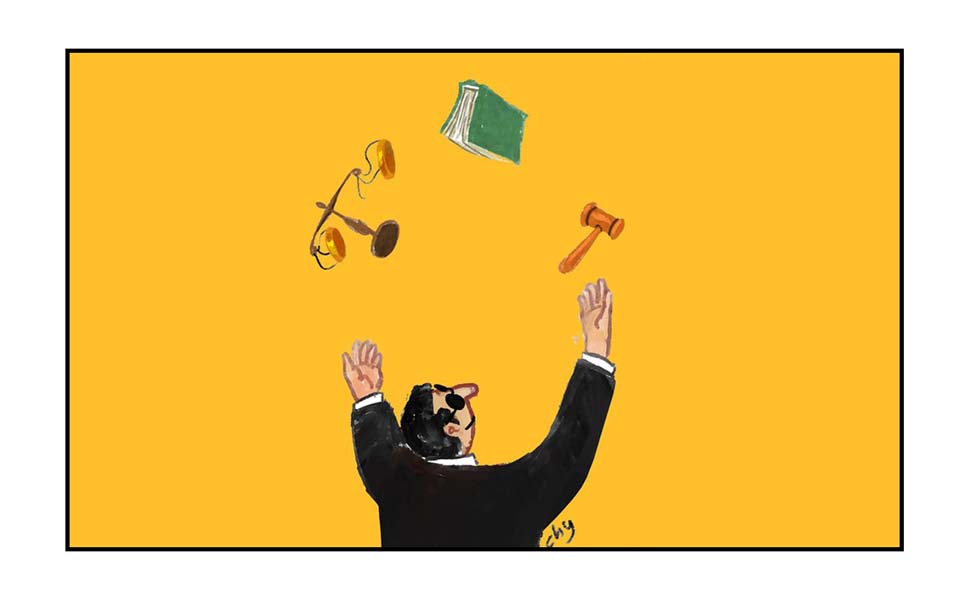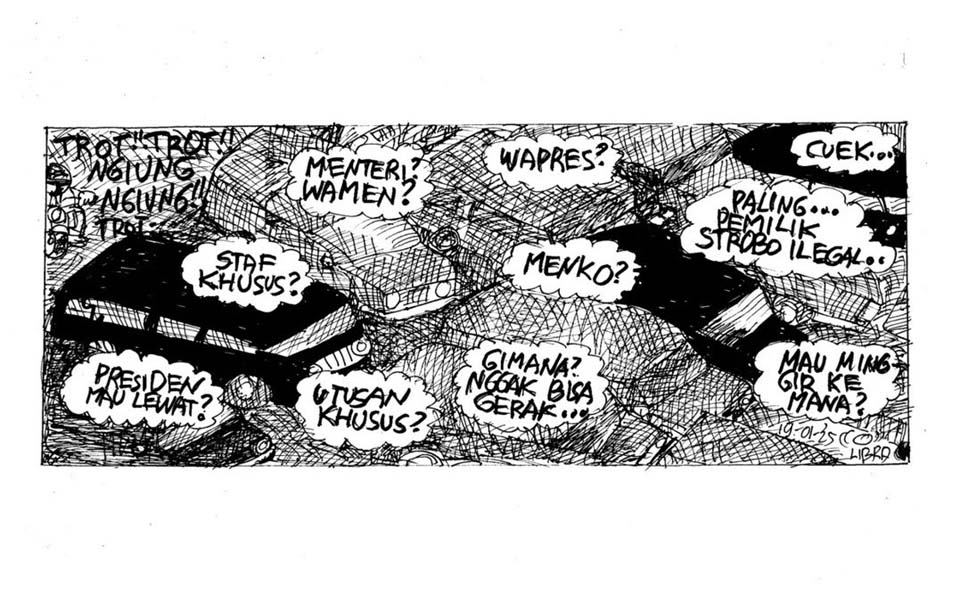
[From an oped piece in Kompas.id by Edwin Partogi Pasaribu from the Witness and Victim Protection Agency (LPSK) and the Public Virtue Research Institute titled "The Two Faces of Law Enforcement".]
Just look at the use of private jet facilities by the youngest son and the daughter-in-law of President Joko "Jokowi" Widodo. Compare this with I Nyoman Sukena who raised a Javanese porcupine in Bali and Kakek (Grandfather) Priyono (61) who raised an alligator fish in Malang.
Although the state prosecutor finally demanded that Sukena be released, a comparison of the above incidents still shows that the law is "sharp downwards but blunt upwards" (hard on ordinary people but soft on the rich and powerful).
Although this is not comparing apples to apples, the picture of the use private jet facilities and raising animals creates the impression that the law is not the same for all citizens. The law seems to have a caste (stratification).
Private jet
The public questioned the use of the private jet by officials and their families because of the potential for gratification.
This is because gratification includes giving something in any form to civil servants or state administrators, including the families of state officials, which is related to their position.
Gratification can be in the form of money, goods, rebates (discounts), commissions, interest-free loans, travel tickets, accommodation facilities, tours and even healthcare.
Jakarta State University (UNJ) lecturer Ubaidilah Badrun reported the private jet issue to the Corruption Eradication Commission (KPK). The KPK, which initially said it would ask for clarification from Widodo's son Kaesang Pangarep, then changed course. The KPK stated that Pangarep did not need to provide a clarification because he was not a state administrator.
Meanwhile, in the case of a similar report against President Widodo's son-in-law Medan Mayor Bobby Nasution on September 6, so far there has been no follow-up.
So what's up with the KPK? But it was not just in Indonesia. Septian Hartono, a Singaporean citizen, also reported Garena's alleged involvement in the private jet affair to the Singapore Corrupt Practices Investigation Bureau (CPIB).
Garena is a Singapore-based company, which is under the umbrella of parent company SEA Limited, which also oversees the e-commerce company Shopee.
It is quite reasonable for the public to gape with amazement at the use of the private jet. If you use a Gulfstream G650 type aircraft the rental fee per hour is in the range of 265.8 million to 308.8 million rupiah. Fantastic.
University of Adelaide public policy professor Adam Graycar says that although gifts and gratuities for civil servants (including family members) are sometimes vague – they can be wedding gifts, birthday gifts or condolence money, and so on – the nature of both is actually the same.
From an anthropological perspective, Graycar said that prohibited gifts and gratuities both have three characteristics, namely triggering reciprocity, demanding a process of exchange and being reciprocal (quid pro quo) (aclc.kpk.go.id).
Gratification can come from friendship and closeness by means of giving gifts. This slowly erodes a person's integrity. Therefore, we often hear that gratification is the root of corruption. Officials are often confronted with a dilemma of integrity when faced with gift giving.
For those whose integrity is weak and who frequently accept gifts, this can lead to blackmail or conflicts of interest.
Allegations of gratification require in-depth investigation, clear evidence, and the courage to prosecute public figures who have political influence.
These cases tend to face a slow legal process, and are sometimes ignored, which gives rise to the public perception that there is injustice or “selective” law enforcement against influential people.
Unlike the KPK in Indonesia, the South Korean Attorney General's Office will begin an investigation into First Lady Kim Keon Hee regarding the Dior bag scandal or gratification case. Kim received the luxury bag as a gift from a pastor in 2022.
Raising animals
Then look at the case of I Nyoman Sukena. He was arrested by police in March 2024. Sukena became a defendant after being caught keeping a Javanese porcupine. The animal was initially a plantation pest because it had been damaging crops. Sukena did not know that the porcupine was an animal protected by law. For his actions, Sukena faced up to five years in prison.
Even worse was the fate of Kakek Priyono. After raising the alligator fish for 16 years, on September 10, 2024, the Malang District Court sentenced him to five years in prison and a fine of 5 million rupiah or an additional one month in prison.
From the above incidents, it seems that the analogy of the law being blunt upwards and sharp downwards is still relevant. This phenomenon often occurs when law enforcement officers, such as police, prosecutors, or judges, are more assertive in prosecuting crimes committed by the lower classes, but are weak or even ignore crimes involving officials or influential people.
This is a picture of the failure of law enforcement in fulfilling the principles of justice. The law tends to punish those who are weak or powerless. Those who have political or economic power are considered to be "above" and often avoid legal consequences, while those "below" who have no influence or power are therefore easier targets for the law.
The full article in Bahasa Indonesia can be read here: https://www.kompas.id/baca/opini/2024/09/17/dua-wajah-penegakan-hukum














